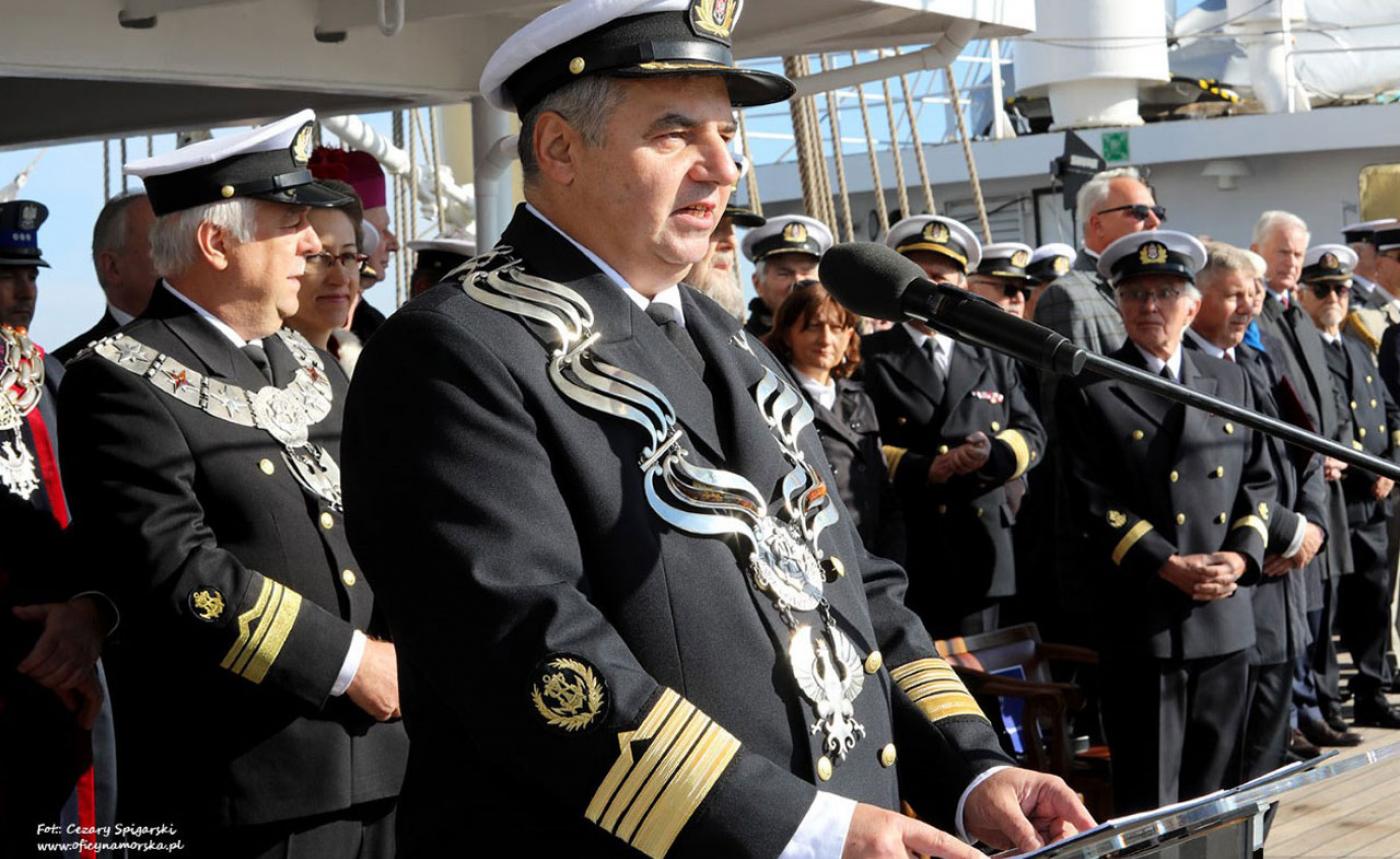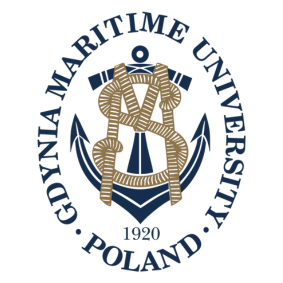Rector's Speech

During his inauguration speech, HM Rector Professor Adam Weintrit congratulated students on their choice of University, whilst highlighting its elite character. The Rector drew attention to the fact that, from the beginning of the University’s existence, it’s role, importance and position were continually, growing, eventually leading to a change in its status and the resultant change of its name:
Today we are inaugurating a new academic year. The 102nd year in the history of Polish maritime education, beginning with the foundation of the Maritime School in Tczew, through the Maritime School in Gdynia, the war period in England in London, Southampton, Lilford and Landywood near Birmingham, to the State Maritime School, the Maritime Higher School and the Maritime Academy, and finally Gdynia Maritime University.
The Rector drew attention to the solemnity of the occasion: In just a moment, you will become equal members of our academic community. He also referenced the importance of Kosciuszko Square, the place in which the inauguaration took place, mentioning the names of prominent Poles with who it is associated: Tadeusz Kosciuszko, John Paul II, Józef Conrad Korzeniowski, Karol Olgierd Borchardt, Mariusz Zaruskieg, Kazimierz Porębskieg, Tadeusz Wenda, Józef Kwiatkowski, Mamert Stankiewicz, Konstanty Maciejewicz, Kazimierz Jurkiewicz, Tadeusz Olechnowicz, Leszek Wiktorowicz. Regarding the geographical location of the Square, he spoke of discussions held with the local authorities regarding the installation of a sundial in the square between the restaurant “Róża Wiatrów” and the building of the Faculty of Navigation. He also mentioned the prominent position of Gdynia Maritime University in the World Rankings of Maritime Universities:
For the past 100 years we have been, and I hope, we will continue to be a powerhouse in the education of personnel for the Polish and international merchant navies and the widely understood maritime economy. Gdynia Maritime University has become a world-renowned opinion-forming and trend-setting centre in fields connected with transport and maritime education, as well as maritime transport safety.
We are more than a University. We are also an established centre of scientific research. The Maritime Institute, a scientific research unit with 70 years of experience in research and implementation within the maritime industry, is also an integral part of the University’s structure. We have more than 800 members of staff. Currently, more than 4,400 students are studying here, across four faculties, 9 fields of study with 42 specialisations in navigation, maritime transport, electrical engineering, electronics and telecommunications, IT, mechanics and mechanical engineering, quality science and management.
What distinguishes us is our unique model of education, in which we endeavour to maintain a balance between theory and practical learning. All this is thanks to our modern laboratories and simulators, our accredited research facilities, and training and research vessels. The “Dar Młodzieży”, the sailing ship on which our students undergo the required seamanship training, is not only the University’s showpiece on the world stage but also an extraordinary ambassador of Poland. Also part of the University float are the research and training vessel “Horyzont II” which is capable of sailing in polar waters, the “Imor”, a research ship equipped with the most recent technologies, as well as several other small units. In June of this year, the GMU Senate committed the Rector to take actions aimed at making preparations to begin the construction of a successor to the “Dar Młodzieży”, which will enter its 40th year of service next year.
Here the Rector made mention of the great success of the Independence Voyage around the world, adding that the sailing ship has, since the very beginning, always been part of the School’s education process. He reminded us that in September 2021, we marked the centenary of the raising of the flag on the first training sailing ship, the “Lwów”, before outlining the next steps in the University’s development.
The dynamic development of offshore technology and the offshore market in Europe and around the world compels us to take action in relation to offshore wind energy. For this reason, we decided to create the Offshore Wind Energy Centre, which will become an important training centre for the OWE sector, and to build a Gdynia Maritime University Offshore Centre, which will become an essential research and education facility for the country's offshore wind sector. Gdynia Maritime University is currently the only centre of research and development in the country to carry out comprehensive R&D work of a specialist nature for the needs of the innovative maritime industry.
Also worth mentioning is our unique-on-a-global-scale Ship Handling Centre in Iława, which provides courses and training to improve ship manoeuvring skills. The Centre is run by the Foundation for Safety in Shipping and the Protection of the Environment and was founded 30 years ago in collaboration with the University of Gdansk.
We cooperate widely with other international institutions, including in exchange of lecturers, joint research projects, as well as student exchanges and collaboration. Our work is often published in the most important scientific journals. We are the organisers of conferences of international scale. In addition to the internationally recognised scientific conferences, such as TransNav, we mustn't forget the wide range of conferences organised by students and student scientific circles.
We are members of the International Association of Maritime Universities (IAMU), and actively contribute to the work of the UN International Maritime Organisation. Our experts participate in the legislative work of IMO sub-committees, through which they are involved in the development of international standards.
Gdynia Maritime University is one of the largest maritime universities in the European Union, training merchant navy officers and future managers for the inland maritime sector since 1920.
As a leading academic centre conducting research and educating staff for the needs of the maritime economy, for many years Gdynia Maritime University has consistently set itself objectives and taken actions to become an increasingly modern and competitive University in public higher education, as well as scientific research. Meeting these challenges requires not only courageous decisions or far-reaching development plans, but also increased funding for the University to make these plans a reality.Today, the realisation of such plans can be seen in the construction of the Offshore Centre, soon we will begin construction of new sports complex, and have already began efforts aimed at the construction of the successor to the “Dar Młodzieży”. Also important is the further, consistent digitalisation of the University as part of the integration of Pomeranian academic communities.
Noteworthy is the fact that GMU carries out a wide range of research and analyses - hydrological, hydro-meteorological, hydrochemical, geomorphological, studies in the fields of offshore renewable energy and biotic components, navigation, safety and rescue in offshore transport in areas where there are plans for the construction of offshore wind farms, and with a view to the next stage of development - the exploitation of hydrogen technology.
Implementation work useful for the planning and construction of offshore wind farms, wind farm connections and other installations and transmission networks built on the seabed are unlikely to be possible without the participation of the University, including the Maritime Institute.
In order to meet this strategic national aim, the University is has made commitments with other education centres in Poland and abroad as well as the country’s biggest business entities, such as PGE and ORLEN, LOTOS, Energa, Industrial Development Agency JSC, Geofizyka Torun, Gdynia Maritime Agency and Mewo.
During the 2021/2022 academic year, we opened a new master’s degree programme in Logistics for the Offshore Sector in the Faculty of Navigation, in addition to which, in the spring semester, we shall begin running another new master’s degree programme, in cooperation with the Gdansk University of Technology, in Offshore Wind Energy as well as postgraduate studies in “Risk Management in the Offshore Extraction and Offshore Wind Industries”.
We are also currently preparing documentation on the creation of an inter-collegial study programme, in collaboration with the AGH University of Science and Technology in Krakow, in Marine Geophysics.
March 2021/2022 will see the opening of the first Executive Offshore Wind MBA in Poland, which will be conducted in collaboration with Hochschule Bremerhaven and Business Academy SouthWest in Esbjerg. Andrzej Popadiuk, the Rector’s Plenipotentiary for MBA Studies, will take up the role of Director of the Gdynia Maritime University Offshore Wind Energy Centre.
The Rector also counted the conferral of the academic title of professor on three of the University’s lecturers among the greatest successes of the academic year: Tomasz Tarasiuk – Deputy Rector for Development and Cooperation, Andrzej Miszczak – Dean of the Faculty of Marine Engineering and Lech Murawski – Head of the Department of Fundamentals of Technology.
Taking advantage of the presence of the Minister of Education and Science, the Rector requested the inclusion of the Scientific Journal of Gdynia Maritime University in the updated list of scientific journals and peer-reviewed international conference materials. The Scientific Journal of Gdynia Maritime University (SJGMU) is an interdisciplinary scientific journal which has been published continuously for more than 40 years and is the continuation of the original publication, “Zeszyty Naukowe Akademii Morskiej w Gdyni” [The Scientific Journal of Gdynia Maritime Academy]. The journal publishes research in relation to a wide spectrum of maritime issues from subject areas such as civil engineering and transport, automation, electronics and electrical engineering, quality science, mechanical engineering and earth and environmental sciences.
HM GMU Rector also requested that the journal TransNav, the International Journal on Marine Navigation and Safety of Sea Transportation www.transnav.eu(link is external) be awarded more points in the Scopus and Web of Science databases in which it has been indexed for many years. The quarterly is a recognised industry journal with a high reputation and global position, also thanks to the biennial Conference organised jointly with The Nautical Institute, TransNav, which is attended by over three hundred participants from over 60 countries from all continents, and the members of the Scientific Committee are the most important authorities in the shipping world from dozens of universities affiliated to the International Association of Maritime Universities IAMU and beyond.
Towards the end of his speech, the Rector wished students health, success and perseverance, and above all, a return to normality following the pandemic. He wished students just beginning their maritime studies the honour of sailing under the white and red flag in the future, before thanking members of the clergy for their services to the University:
I would like to take the opportunity to extend my sincere thanks to father Edward Pracz, the pastor of the People of the Sea at the Stella Maris Centre, for the ceremonial holy mass he offered today, at the /Redemptorist Church in Gdynia, in the intentions of the staff, doctoral candidates, students and alumni of our Alma Mater. I would like to thank His Excellency Bishop Zbigniew Zieliński for accepting our invitation to celebrate mass with us, as well as the University choir under the direction of Karol Hilla, whose performance gave an air of celebration to the mass and today’s proceedings.
On behalf of our academic community, I would also like to thank His Excellence Archbishop Tadeusz Wojdy for the ceremonial holy mass on the occasion of the inauguration of the 2021/2022 academic year in Pomerania, which was celebrated last Friday, 1st November 2020 in the Basilica Cathedral in Gdansk, Oliwa.
The Rector ended his speech with a Latin maxim: Quod Bonum Felix Faustum Fortunatum-que Sit! - in this way wishing everyone present a ‘good, propitious, lucky and successful’ academic year.
May the best of luck be with us! And may this new academic year bring goodness, happiness and success. I declare the 2021/2022 academic year open!

